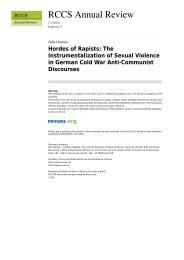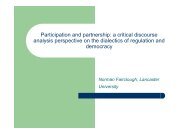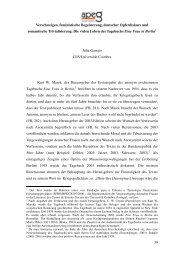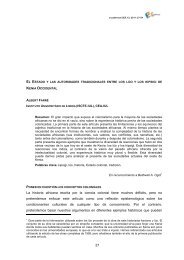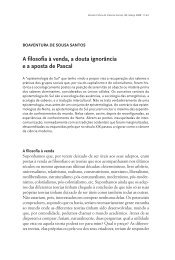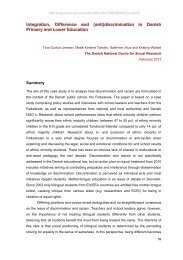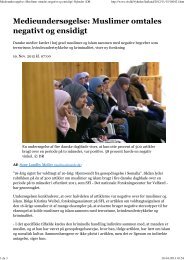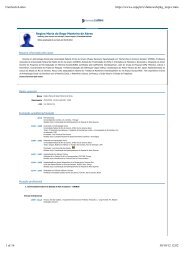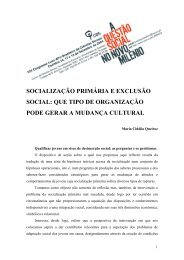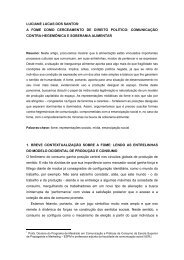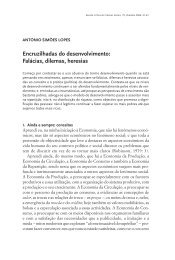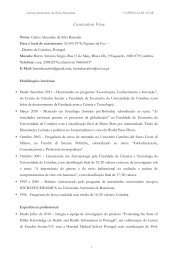Analysis of Integration Policies and Public State-Endorsed ...
Analysis of Integration Policies and Public State-Endorsed ...
Analysis of Integration Policies and Public State-Endorsed ...
Create successful ePaper yourself
Turn your PDF publications into a flip-book with our unique Google optimized e-Paper software.
Working paper produced within the TOLERACE project<br />
In respect to education, ECRI urged the Danish Government to take measures<br />
to better integrate ethnic minority children in public schools within a multicultural<br />
environment, providing, e.g., mother tongue education. Since 2005 measures have<br />
been taken to spread <strong>and</strong> mix ethnic minority <strong>and</strong> majority children in public schools,<br />
e.g., the ‗Copenhagen model‘ (Københavnermodellen). Still, ethnic minority children<br />
with non-Western background do not have the same rights to mother tongue education<br />
as pupils from EU countries.<br />
In its last report, ECRI furthermore urged the Danish Government to adopt <strong>and</strong><br />
implement a consistent long-term policy for integrating minority groups in the labour<br />
market, e.g. by combating racial discrimination <strong>and</strong> promoting ethnic diversity at the<br />
labour market. According to article 13 <strong>of</strong> EU´s Racial Equality Directive, Denmark was<br />
categorised as a specialised body for the promotion <strong>of</strong> equal treatment with some<br />
limitations in coverage because trade union members needed to access their trade<br />
union, rather than the specialised body, regarding employment cases (EUMC, 2006).<br />
The Danish government changed this limitation by adding the Act on Prohibition <strong>of</strong><br />
Discrimination on the Labour Market in 2008 (as described in previous section). The<br />
work <strong>of</strong> the new Board <strong>of</strong> Equal Treatment includes complaints related to labour market<br />
discrimination.<br />
In respect to housing sector <strong>and</strong> urban planning, ECRI recommended that the<br />
Danish Government take measures to ensure more multicultural neighbourhoods to<br />
combat segregation. Whereas the Danish government has taken measures to ensure<br />
diversity in residential areas since 2004, this has not yet resulted in any significant<br />
formation <strong>of</strong> multicultural neighbourhoods.<br />
Finally, the 2006 report <strong>of</strong> ECRI pointed to special problem areas such as the<br />
general climate <strong>of</strong> intolerance <strong>and</strong> discrimination against minorities, in particular Muslim<br />
minorities. ECRI particularly blamed the media <strong>and</strong> the politicians for this development,<br />
pointing to negative the polarizing effects there<strong>of</strong>. The role <strong>of</strong> the Danish media in<br />
creating negative images <strong>of</strong> ethnic minorities was already pointed out in the 1998-<br />
report on the situation regarding racism <strong>and</strong> xenophobia in the European community<br />
(EUMC, 1999: 27). The publication <strong>of</strong> the third ECRI report coincided with the Danish<br />
cartoon affair, which initiated a heated public debate on Muslim minorities that is still<br />
going on (Jensen, forthcoming). Eleven Muslim organisations in Denmark accused<br />
Jyll<strong>and</strong>sposten, the newspaper that published the cartoons, for blasphemy <strong>and</strong> racial<br />
discrimination, but the case was never put on public trial.<br />
70



